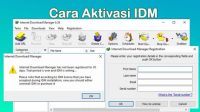Error Windows cannot connect to the Printer dapat terjadi ketika komputer atau PC Anda dihubungkan terhadap beberapa jenis dan merk printer yang berbeda beda yang terhubung pada satu jaringan komputer atau PC Anda. Masalah ini dapat terjadi ketika printer sudah selesai terinstall namun Windows pada laptop, komputer atau PC Anda salah mencari file Mscms.dll pada subfolder yang berbeda dengan subfolder windows \ system32.
Namun, Anda tidak usah risau, berikut cara mengatasi error Windows cannot connect to the Printer yang dapat Anda coba!
Cara Atasi Error Windows Cannot Connect To The Printer
1. Cara Atasi Error Windows cannot connect to the Printer dengan Salin Mscms.dll
- Langkah pertama, buka file, kemudian klik ke folder C, buka direktori C: \Windows\system32\
- Temukan file mscms.dll dan klik salin

- Paste atau salin file mscmc.dll pada lokasi berikut :
C: \windows\system32\spool\drivers\x64\3\ (jika arsitektur PC Anda Windows 64 bit)
C: \windows\system32\spool\drivers\w32x86\3\ (jika arsitektur PC Anda Windows 32 bit)
- Start ulang Komputer atau PC Anda supaya perubahan tersebut tersimpan, dan sambungkan ulang ke printer dan tes lagi.
2. Cara Atasi Error Windows cannot connect to the Printer dengan membuat Port Lokal Baru
- Langkah pertama, klik tombol windows bersamaan dengan tombol X, kemudian klik control panel

Tampilan tab control panel - Kemudian pilih hardware and sound, lalu pilih tab devices and printers

Tampilan tab hardware and sound - Pilih add a printer pada menu yang terdapat di atas

Tampilan tab devices and printers - Lihat apakah printer Anda sudah terdaftar atau belum, jika belum silahkan klik tulisan “the printer that I want isn’t listed”

Tampilan tab add a device - Silahkan pilih add a local printer or network printer with manual settings, lalu pilih next

- Pilih tab create a new port

Tampilan tab add a printer - Dari type of port drop-down, klik local port, dan klik next

- Tulis alamat printer pada kolom printers port name sebagai berikut :
\\IP address or the computer name\Printers Name
- Klik OK dan klik next
- Silahkan ikuti langkah langkah yang tertera pada layar PC Anda sampai semua proses selesai.
3. Cara Atasi Error Windows cannot connect to the Printer dengan Restart Print Spooler Service
- Langkah pertama, klik tombol windows bersamaan dengan tombol R
- Setelah itu tulis services.msc kemudian klik enter

Tampilan tab run - Cari layanan Print Spooler pada daftar
- Setelah layanan print spooler ketemu, klik dua kali di atasnya
- Silahkan cek apakah jenis start up sudah dalam mode automatic apa belum, jika belum maka aturlah ke mode automatic dan layanan berjalan

- Jika selesai, pilih stop, lalu pilih start untuk restart
- Pilih apply
- Pilih ok
- Silahkan coba untuk menambahkan printer, dan tes kembali apakah sudah berhasil atau belum.
4. Cara Atasi Error Windows cannot connect to the Printer dengan Menghapus Driver Printer yang Tidak Kompatibel
- Pertama, klik tombol windows bersamaan dengan tombol R
- Pada kolom yang tersedia silahkan Anda ketik printmanagement.msc lalu klik tombol enter
- Pada panel jendela kiri, klik all drivers

Tampilan tab print management - Pada panel sebelah kanan, pada driver printer klik kanan, lalu klik delete
- Silahkan cek nama driver printernya, jika terdapat lebih dari satu, maka ulangi langkah diatas
- Lakukan install driver secara manual
5. Cara Atasi Error Windows cannot connect to the Printer dengan Memperbaiki Registry
- Langkah pertama ialah menghentikan printer spooler service
- Lalu, klik tombol windows bersamaan dengan tombol R
- Ketik regedit pada kolom yang muncul, lalu klik tombol enter

- Tunggu registry editor terbuka lalu arahkan ke kunci registry ini : HKEY_LOKAL_MACHINE\SOFTWARE\Microsoft\Windows
NT\CurrentVersion\Print\Providers\Client Side Rendering Print Provider

- Cara Client Side Rendering Print Provider lalu klik kanan, dan hapus
- Coba untuk cek ulang printer Anda apakah sudah berhasil atau belum.
Demikian, 5 cara mengatasi error windows cannot connect to the printer yang dapat Anda coba. Semoga artikel ANGKASA ini dapat bermanfaat bagi Anda!







